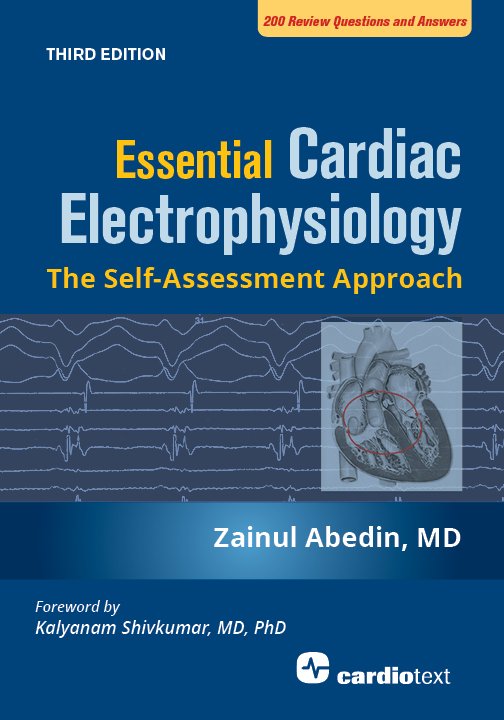Essential Cardiac Electrophysiology: The Self-Assessment Approach, Third Edition - Abedin 9781942909293
Essential Cardiac Electrophysiology: The Self-Assessment Approach, Third Edition - Abedin 9781942909293
Essential Cardiac Electrophysiology: The Self-Assessment Approach, Third Edition
by Zainul Abedin, MD
Publication Details:
Publication Date: 3/2020
ISBN: 9781942909293
eISBN: 9781942909378
Trim Size: 7 x 10 inches
784 pages
Format: Paperback and eBook set; eBook
About:
“This book will be instantly enjoyed by electrophysiologists at all career stages as it communicates highly relevant information and provides an ‘instant check’ of one’s knowledge base.”
~From the foreword by Kalyanam Shivkumar, MD, PhD, FHRS, FRCP (Lond-Hon)
Fact-based and clinically-focused, this new third edition of Essential Cardiac Electrophysiology: The Self-Assessment Approach is an ideal reference in a bullet-point format that provides a concise and essential overview of electrophysiology.
Packed with ABIM-style 200 multiple-choice questions designed to aid readers' understanding of key concepts and retention of essential facts, it is an excellent study aid for electrophysiology fellows, cardiology fellows, and electrophysiologists preparing for board examination or other EP certifications.
Comprehensively updated with the latest recommendations and findings, it includes multiple tables, electrophysiology tracings and illustrations, and a treasury of electrophysiology pearls.
This expanded Third Edition includes new chapters on AV blocks, channelopathies, and ventricular arrhythmias in a structurally normal heart, along with enhanced coverage of:
· Electrophysiologic aspects of AVNRT and AVRT
· Long and short RP tachycardia
· Parahisian pacing
· Bystander activation of accessory pathways
· Brugada syndrome
· Long QT syndrome and pregnancy
A note on the questions: All the questions are ABIM style. Some of the questions have a tangential approach, i.e., not only one has to know the correct diagnosis but also has to know the correct management approach. Some questions are "concept" questions; i.e., it is to evaluate a basic concept to verify understanding.
About the Author
Zainul Abedin, MD, FHRS, FRCPC
Professor of Clinical Medicine
Paul Foster School of Medicine
Texas Tech University Health Sciences Center and The University Medical Center of El Paso
El Paso, Texas
Table of Contents:
1. Ions, Channels, and Currents
2. Electrophysiologic Effects of Cardiac Autonomic Activity
3. Mechanisms of Arrhythmias
4. Sinus Node Dysfunction
5. Atrioventricular (AV) Nodal Blocks
6. Supraventricular Tachycardia
7. Differential Diagnosis of Wide Complex Tachycardia
8. Ventricular Arrhythmias in Structural Heart Disease
9. Channelopathies
10. Ventricular Arrhythmias in Structurally Normal Heart
11. Cardiac Arrhythmias in Patients with Neuromuscular Disorders
12. Syncope
13. Sudden Cardiac Death and Risk Stratification
14. Pharmacologic Therapy of Arrhythmias
15. Electrical Therapy for Cardiac Arrhythmias


